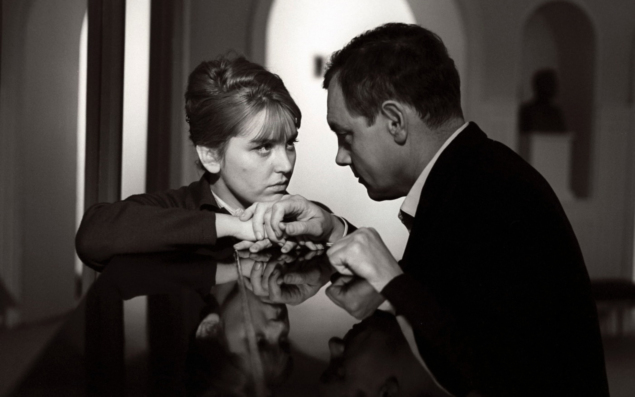The cinema of Khrushchev Thaw leaves without saying goodbye in the only film by the main Soviet screenwriter of the 1960s. Screening as part of the retrospective programme of the Festival of Singular Films.
A Long Happy Life
- Date:
- 22 Sep 2024,
13:00–14:20
- Age restrictions
- 0+
1966, Gennady Shpalikov
USSR
76 minutes, Russian
Starring: Kirill Lavrov, Inna Gulaya, Pavel Luspekaev, Marina Polbentseva
“I like you. Simple words?” They couldn’t be simpler—especially as she also seems to like him. The cultural organiser Lena and Viktor, who seems to be a geologist or a “foreign intelligence officer”, but is actually a travelling engineer, meet on a bus heading for the town of N., which like many Siberian towns has not been fully settled. They soon become close—with assistance from a performance of The Cherry Orchard by the touring Moscow Art Theatre. They trust each other, and it seems that a long happy life will begin the next morning.

Shot from A Long Happy Life, 1966
The storyline was short and angry. It was already lacking Shpalikov’s breath. The heroine did not save the author, she was just as doomed as he was.
—Lyubov Arkus, Seance Magazine
However, it is rather the end of the era that begins in the movie. Gennady Shpalikov, one of the cinema heroes of the Thaw period, writer of the screenplays of Walking the Streets of Moscow (1964) and I Am Twenty (1965), seems to anticipate the cold breath of the coming stagnation in his only directorial work. Idealism and reflections on heroism have left the world, replaced by pragmatic actions and withdrawal into the self. Along with the barge floating endlessly down the Siberian river, unfulfilled dreams float away.
Shpalikov also left the world seven years after the premiere of A Long Happy Life and its almost total rejection by his contemporaries, and he left of his own free will. These years were marked by unproduced films and unwritten scripts, and a feeling of being out of place or even inappropriate. The thaw was long over, and this feeling became part of the very air of Soviet reality.
The screening will begin with a brief speech by the curator in Russian. If you require interpretation into English, please request it at least three days in advance by emailing international@ges-2.org.
